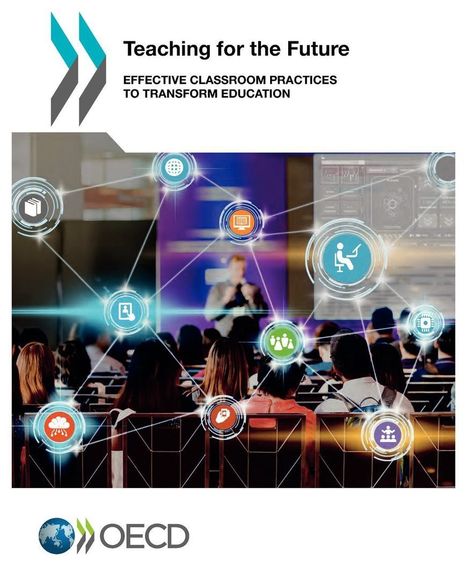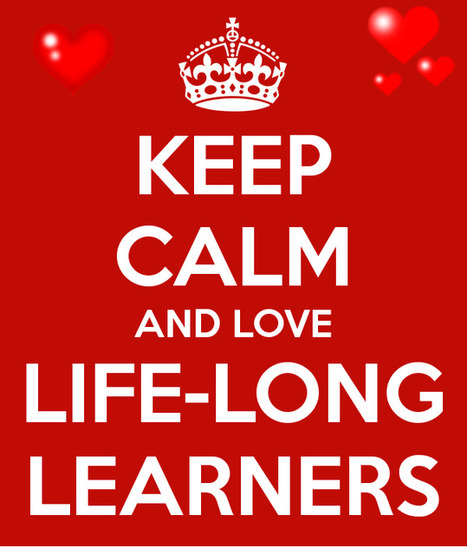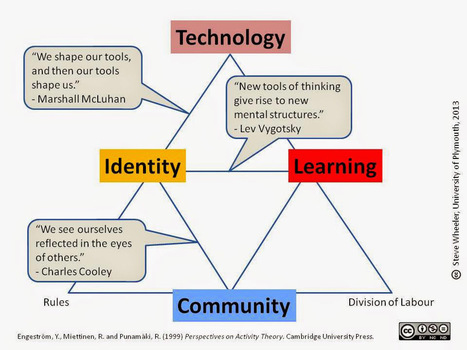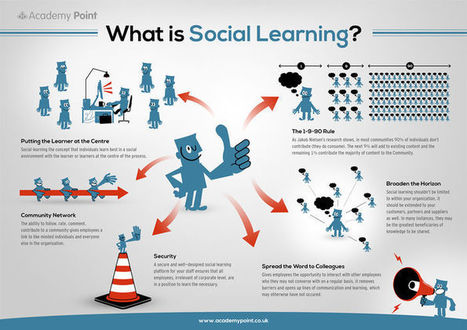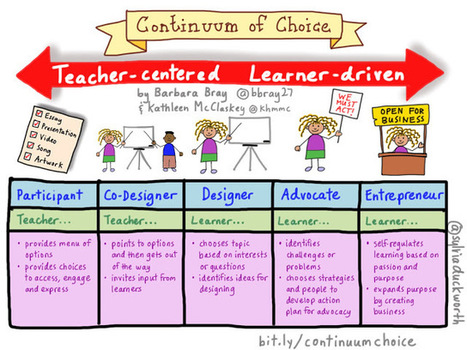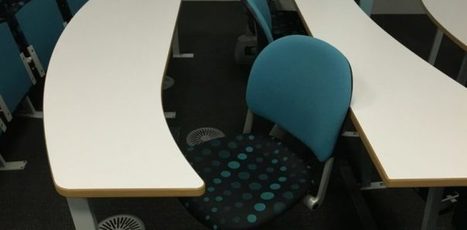 Your new post is loading...
 Your new post is loading...
Learning throughout life makes sense. Research shows it is good for your health, your wealth, your civic engagement and your family’s future prospects. It prolongs your independent life and enriches your quality of life.
For companies, investing in worker skills makes sense too – it promotes flexibility and creativity, problem-solving, teamwork and an increased sense of agency among staff, making them happier and more productive. These are, of course, exactly the traits needed as companies face of the challenges of the latest industrial revolution.
For governments, supporting learning in later life helps to delay the onset of dependency among rapidly ageing populations; plays an important role in overcoming inequality and exclusion; and supports inter-generational learning, creating more resilient families and communities. More broadly, learning fosters improved well-being.
Jacques Delors, then President of the European Commission, summed this up in 1992 when he argued that lifelong learning was crucial to both economic prosperity and social cohesion. Learn more / En savoir plus / Mehr erfahren: https://gustmees.wordpress.com/?s=life+long+learning http://www.scoop.it/t/21st-century-learning-and-teaching/?&tag=Life-Long-Learning https://gustmees.wordpress.com/2015/03/28/learning-to-learn-for-my-professional-development-i-did-it-my-way/
Via Gust MEES
“El aprendizaje permanente es una necesidad. Tenemos que mejorar nuestras aptitudes y competencias a lo largo de la vida para realizarnos en lo personal, participar en la sociedad y tener éxito en el mundo laboral.
Las organizaciones educativas, las de formación… se están dado cuenta, que empiezan a perder su monopolio sobre el aprendizaje. Los aprendices, empleados se atreven a organizarse. Más del 90% de lo que necesita en su trabajo actual, en su universidad… no fue aprendido por las intervenciones de de los aprendizajes formales, sino en situación de aprendizaje informal, como el aprendizaje en el trabajo (LEARNING AND WORK) las discusiones con los compañeros o mentores, etc etc Esa es la respuesta que generalmente se obtiene si se hace la pregunta adecuada Esta situación asusta a las organizaciones de formación – pero no debería.
Want to know how you can Use Social Learning to engage your learners? Check how you can Use Social Learning to engage your learners.
Via juandoming
Shifting to “Learn by Doing” Becker of NMC says just as the role of the teacher is switching from “sage on the stage” to one of a coach or guide, there is a shift from rote to active learning. To foster skills of teamwork and collaboration, online education is incorporating group projects and hands-on labs to help students think more critically and retain the content. Building on the concept of “learn by doing,” online education is expanding to connect students from around the world to learn together and meet professionals. Morris is also executive director of the Center for Interactive Learning and Collaboration, which partners with more than 200 cultural organizations, such as art museums, to offer real-time interaction with experts in various fields. This exposure can help answer student questions about the relevance of a geometry class, for instance. “To answer the questions of why you are doing it is key,” says Morris. “[Students] are motivated when they understand and have a reason to understand the material.” Learn more / En savoir plus / Mehr erfahren: http://www.scoop.it/t/21st-century-learning-and-teaching
Via Elizabeth E Charles, Yashy Tohsaku, Gust MEES, Pieter de Vries
How The Activity Learning Theory Works
Vygotsky’s earlier concept of mediation, which encompassed learning alongside others (Zone of Proximal Development) and through interaction with artifacts, was the basis for Engeström’s version of Activity Theory (known as Scandinavian Activity Theory). Engeström’s approach was to explain human thought processes not simply on the basis of the individual, but in the wider context of the individual’s interactions within the social world through artifacts, and specifically in situations where activities were being produced.
In Activity Theory people (actors) use external tools (e.g. hammer, computer, car) and internal tools (e.g. plans, cognitive maps) to achieve their goals. In the social world there are many artifacts, which are seen not only as objects, but also as things that are embedded within culture, with the result that every object has cultural and/or social significance.
Tools (which can limit or enable) can also be brought to bear on the mediation of social interaction, and they influence both the behavior of the actors (those who use the tools) and also the social structure within which the actors exist (the environment, tools, artifacts). For further reading, here is Engeström’s own overview of 3 Generations of Activity Theory development. The first figure shows Second Generation AT as it is usually presented in the literature.
Via Gust MEES
that it’s important for young people to become economically independent and self-sufficient. But to do that, he argues, they shouldn’t all learn the same thing. Instead, they should be learning to be adaptable, to be innovative, to flow with change, to collaborate and other globalized skills that will apply to whatever area of work they are passionate about pursuing. An education can help expose students to different life paths and support them in finding their passions, while giving them the transferable skills to attack any problem. Learn more / En savoir plus / Mehr erfahren: http://www.scoop.it/t/21st-century-learning-and-teaching/?tag=Sir-Ken-Robinson
Via Gust MEES
|
El aprendizaje no tiene que ser una experiencia "solitaria".
El psicólogo ruso Lev Vygotsky sugirió que el conocimiento se construye a través de nuestras interacciones con los demás.
Los MOOC (Massive Open Online Learning) aprovechan nuestras necesidades sociales inherentes reuniendo a las personas para que aprendan el mismo material en un grupo virtual. Los estudiantes pueden expresar lo que están sintiendo y experimentando con los demás en un espacio compartido, haciendo que el viaje de aprendizaje sea más agradable y menos desalentador.
A medida que las personas ganen confianza, a menudo disfrutarán de una competencia amistosa con sus compañeros aprendices para forzarse a sí mismos a competir en ejercicios y tareas. El reconocimiento es parte de nuestra necesidad de desarrollar la autoestima, y algunos cursos incorporan la gamificación para recompensar los logros de los estudiantes y la ayuda comunitaria. Conozca más / En savoir plus / Mehr erfahren: https://www.scoop.it/t/21st-century-learning-and-teaching/?tag=Social+Learning
Via Gust MEES, María Dolores Díaz Noguera
Scrum is an iterative and incremental agile software development framework for managing product development. It defines "a flexible, holistic product development strategy where a development team works as a unit to reach a common goal", challenges assumptions of the "traditional, sequential approach" to product development, and enables teams to self-organize by encouraging physical co-location or close online collaboration of all team members, as well as daily face-to-face communication among all team members and disciplines involved.
Scrum is an iterative and incremental agile software development framework for managing product development.[1][2] It defines "a flexible, holistic product development strategy where a development team works as a unit to reach a common goal",[3] challenges assumptions of the "traditional, sequential approach"[3] to product development, and enables teams to self-organize by encouraging physical co-location or close online collaboration of all team members, as well as daily face-to-face communication among all team members and disciplines involved.
A key principle of Scrum is its recognition that during product development, the customers can change their minds about what they want and need (often called requirements volatility[4]), and that unpredicted challenges cannot be easily addressed in a traditional predictive or planned manner. As such, Scrum adopts an evidence-based empirical approach—accepting that the problem cannot be fully understood or defined, focusing instead on maximizing the team's ability to deliver quickly, to respond to emerging requirements and to adapt to evolving technologies and changes in market conditions. Learn more / En savoir plus / Mehr erfahren: http://www.scoop.it/t/wordpress-annotum-for-education-science-journal-publishing
Via Gust MEES, Mark E. Deschaine, PhD
juandon Los policy makers, las administraciones, organizaciones etc... pueden diseñar proyectos transversales para poder trabajar con ABP, Personalized learning, social learning, PLE, PLN, Analytic learning, BIG Data etc... El bienestar dentro de una estructura social redárquica es mucho más experimental, no es la “jerarquía de necesidades” de Maslow que nos ocupa en la sociedad posmoderna.…
What is learning? It’s a process of growth… starting at a neurological level, new connections forming… At work, in life, and hopefully in every classroom, people are working to teach and learn. It’s a mental process — but current neuroscience confirms learning is also physical, social, and emotional. Are you someone committed to learning and helping others learn? If so, perhaps you’ve considered:
How does learning work best?
In the Six Seconds community, we’re starting this year focused on this big question and understanding the role of emotions and emotional intelligence as our brains build new insight and meaning. The adventure starts now with five essential highlights (plus inspiring learning quotes) below.
Via David Hain
With the start of a new academic year swiftly approaching (I realise many have already started, sorry) I am again having discussions with academics on the best way to use the spaces they’re given. It’s not only about the size or resolution of the screen/projector. It’s not about the fact there is always a spot-light right above the screen which makes it so difficult to see the content. It is about whether the space is too cold or hot. It is about whether there is enough natural light, or is it annoying neon strip lights? Is there (enough) power sockets spread around the space so trailing wires aren’t a trip hazard? Can students get in and out of the room and seats quickly to enable a quick or easy change between classes? What about the spaces outside the classroom – does the next class block the exit as they hover outside waiting to get it?
Via Marta Torán
But what I did realize is that successful people are successful because they approach learning in a consistent, systematic, results-focused way. Bravery isn't a requirement for success. Innate talent isn't a requirement for success. Talented, highly skilled people don't take big risks yet they still learn to accomplish big things.
How? They prepare. They train. They constantly experiment and adapt and refine, refine, refine. Successful people gain superior skills not by breaking through the envelope but by approaching and then slowly and incrementally expanding the boundaries of that envelope.
The key to learning is to make small, smart changes, evaluate the results, discard what doesn't work, and further refine what does work. When you constantly modify and refine something you already do well, you can do it even better. Learn more / En savoir plus / Mehr erfahren: http://www.scoop.it/t/21st-century-learning-and-teaching/?tag=Success
Via Gust MEES
|



 Your new post is loading...
Your new post is loading...

